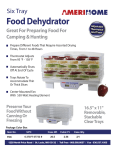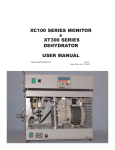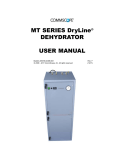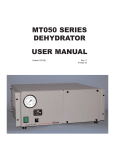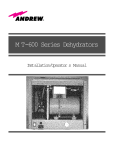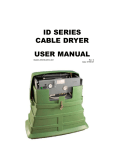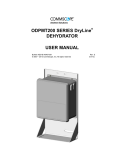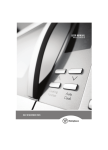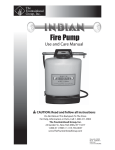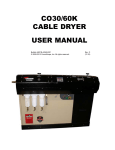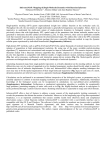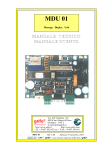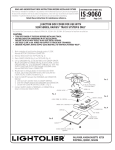Download NXT Series Dehydrator User Manual
Transcript
NXT SERIES DEHYDRATOR USER MANUAL Bulletin AE01B-A0497-001 Rev: A NXT SERIES DEHYDRATOR USER MANUAL TABLE OF CONTENTS SECTION 1 General Information Introduction Description 4 4 4 SECTION 2 Installation Unpacking and Inspection Perform Pre-System Startup Test Place the Dehydrator Install Polyethylene Tubing Lines Connection Procedure Connect Alarm Wiring Connect to Dry Air Cable System Caution: Connect to Power Supply Test the Unit System Volumes, Times to Purge and Pressurize 5 5 5 6 6 6 8 11 11 12 13 SECTION 3 Controls and Displays Dehydrator Controls Microprocessor Control Keys Digital Display Window 14 14 14 14 SECTION 4 Operation Control Status and Programming Main Menu Familiarize yourself with the Displays Program Mode Submenu Pressure Monitoring and Control Programming Procedure Shutdown Procedure 15 15 15 15 15 20 20 20 SECTION 5 Theory of Operation Dehydrator Dehydrator Control Schematic ( -9XXXX Master) Schematic ( -0XXXX Slave) 21 21 21 22 23 SECTION 6 Maintenance Semi-Annual Preventive Maintenance Inspection 24 24 SECTION 7 In Case of Difficulty 26 2 NXT SERIES DEHYDRATOR USER MANUAL TABLE OF CONTENTS SECTION 8 Parts Replacement and Dehydrator Overhaul Additional Dehydrator Spare Parts Parts Replacement Procedures Unit Shutdown and Removal Door and Panel Removal Replace Power Switch Replace Circuit Breaker Replace Compressor Control PCB Replace Compressor Replace Heat Exchanger Replace Water Filter Element - 3000 hour Maintenance Replace Coalescing Filter Element Replace Cooling Fan Replace Microprocessor Board 27 28 30 30 30 30 30 30 30 31 31 31 31 32 SECTION 9 Specifications Specifications for Dehydrators NXT SERIES 33 33 SECTION 10 Customer Support 24 Hour Technical Service Hotlin Free Loaner Program 34 34 34 SECTION 11 Warranty 35 3 NXT SERIES DEHYDRATOR USER MANUAL General Information Section 1 1.1 Introducing New DryLineTM Dehydrators. The Andrew DryLineTM NXT1000/2000/4500 Dehydrators are a new generation of pressurization equipment for antenna and transmission line systems. They feature a new patented membrane separation drying technology for the industry's best performance and reliability plus many exclusive new features such as microprocessor control an quiet operation. Each large DryLineTM dehydrator is a pressurization system built into a convenient chassis, floor-mounted package. It is a selfcontained unit containing many components which, in other systems, are typically pieced together on site. This Manual contains the information you need to install, operate and maintain your DryLineTM NXT Series dehydrator. 1.2 Description 1.3 DryLineTM dehydrators provide a source of dry nitrogen -45°C (50°F) dew point or drier, for pressurizing large antenna and transmission line systems. Output pressure can be set and controlled within the range of 0.3 to 5 lb/in2 (2 35 kPa). Introducing the DryLineTM Redundant Hot Standby Dehydrators The Andrew NXT Series DryLineTM Dehydrator provides a new level of transmission line system protection through the Redundant Hot Standby version. In this configuration, two NXT Series Dehydrators are connected together, providing dry nitrogen distribution to one or more transmission lines and common control over the operation of both dehydrators. The system also provides additional capacity for very large, tight systems where the flow of a single dehydrator is not sufficient for purging and initial pressurization, but is adequate for maintaining pressure, once established. Air pressure is generated by an air compressor and the dry nitrogen is produced by permeable separation of the water vapor and oxygen through a membrane cartridge, eliminating the use of timer-controlled heaters, solenoid valves, desiccant towers and associated wiring, providing greater reliability. The internal microprocessor control circuitry provides several major options including programmable alarms and operating thresholds. 4 NXT SERIES DEHYDRATOR USER MANUAL Installation Section 2 2.1 Unpack Dehydrator and Line Monitor and Inspect for Shipping Damage Carefully remove packing material. Check the dehydrator and line monitor for shipping damage such as dents or loose parts. Open the dehydrator front door and check for loose wires, hoses, or components. If anything is loose, refer to the piping schematic (Figure 10) or the wiring schematic (Figure 12) for proper placement. Figure 1 If there is damage or if there are any other problems, contact Andrew Technical Service. Telephone numbers are listed on page 34. If everything looks correct, close the dehydrator front door. 2.2 Perform Pre-System Startup Test Make sure power switch is in the OFF position. Plug the dehydrator into a proper electrical outlet. Proper outlets are defined in the specifications, Section 9. Do not connect the air lines on the unit at this time. Within 30 seconds the display on the front panel will show a pressure reading of 0.0 and the compressor should start. As the unit warms up, check the filter bowls (See Figures 1) to ensure condensate is being released and not building up in each bowl. Check the pressure gauge at the top or bottom of the membrane tube. Verify it is at 90 psi ±5psi. Adjust the valve if necessary to show 90 psi. Check the air output port at the top of the unit to make sure that air is flowing out. If problems exist, review troubleshooting procedures in Section 7 or consult Andrew Technical Service. If these items check out, turn power switch off, unplug the unit and close the dehydrator front door. For the Redundant Hot Standby configuration, there is a control line from the master unit which connects to the input line on the slave unit. 5 NXT SERIES DEHYDRATOR USER MANUAL 2.3 Place the Dehydrator on the transmission line. The dehydrator will not operate properly. The DryLineTM NXT SERIES dehydrator is designed for to be floor standing. The unit is shipped with the power cord and air lines placed through the top of the unit. 2.4 CAUTION: Do not operate the unit with the pressure sense line disconnected, this may result in an over pressure condition. Also be sure that any isolation valves are open before operating the unit. Install Polyethylene Tubing Lines * Output lines (4) with individual valves. * Pressure sense line * For the Redundant version, the slave unit sense line. 2.5 Connection Procedure Connect the Transmission Line Tubing. Insert the tubing runs from the transmission lines into the fittings in the top panel marked "Outlet". Connect the Remote Sense Line Tubing. Insert a single tubing run from the transmission line into the fitting in the top panel marked "Remote Sense". Install the isolation shutoff valves. The valves when used on output lines, allow the system to retain pressure while the system is removed for servicing. Place each valve in line between each output and transmission line. For Redundant Hot Standby, use the Tee fitting (optional) to connect the output lines together (from the master and slave units). Do not install the "Remote Sense" and "Output" lines into a Tee Fitting into one port 6 NXT SERIES DEHYDRATOR USER MANUAL NXT Series System configuration diagram Basic This configuration shows proper hook up for systems when only a single waveguide is required in the system. * Remote Pressure Sense Line Isolation Shut-off Valves Primary Large Wave Guide Dehydrator Output Line NXT Dehydrator CAUTION! Do not operate the Dehydrator with the system isolation valves closed or with the remote sensing line disconnected. Serious damage to the wave guide due to overpressure can occur. * Note! To provide extra overpressure protection a secondary popoff valve may be added at this point that is closely matched to the maximum system safe pressure. See specification page for options available 7 NXT SERIES DEHYDRATOR USER MANUAL 2.6 Connect Alarm Wiring Function Terminal Symbol Open the front door and connect the alarm wiring to terminals shown in figure 2. See below High Pressure Common - Upper terminal strip High Humidity Normally Open High Pressure Normally Open High Humidity Common + + Excess Run Common - Excess Run Normally Open + Low Pressure Common - Low Pressure Normally Open + Power Fail Common - Power Fail Normally Open + Jumper JP7 JP2 JP4 JP6 JP5 If Normally Closed contacts are desired, move the jumper on the PC boards to the N.C. position. Jumper on positions A-B for normally open, position B-C for normally closed. All alarms are dry contacts and can be ganged together if a single alarm is desired. See figure 3. Figure 3 Upper terminal strip Figure 2 Alarms Jumpers 8 NXT SERIES DEHYDRATOR USER MANUAL NXT Series System configuration diagram MultiLine This configuration shows proper hook up for systems, when when more than a single wave waveguide is required in the system. For larger systems an 8- output manifold can be added. This diagram can also be used for hooking DP-4A-001 or MN6600 Series Manifold to the system. * Remote Pressure Sense Line Isolation Shut-off Valves Primary Large Wave Guide Dehydrator Output Line NXT Dehydrator Tee Fitting LM400 Line Monitor Any other Monitor or Manifold can be used in this location to expand the system. Outputs to other Wave Guides CAUTION! Do not operate the Dehydrator with the system isolation valves closed or with the remote sensing line disconnected. Serious damage to the wave guide due to overpressure can occur. * Note! To provide extra overpressure protection a secondary popoff valve may be added at this point that is closely matched to the maximum system safe pressure. See specification page for options available 9 NXT SERIES DEHYDRATOR USER MANUAL This configuration shows proper hook up for a redundant system configuration. Dehydrator outputs connected with tee fitting 5VDC control cable Isolation Shut-off Valves Primary Large Wave Guide Remote Pressure Sense Line NXT Redundant Slave NXT Redundant Master * CAUTION! Do not operate the Dehydrator with the system isolation valves closed or with the remote sensing line disconnected. Serious damage to the wave guide due to overpressure can occur. * Note! To provide extra overpressure protection a secondary popoff valve may be added at this point that is closely matched to the maximum system safe pressure. See specification page for options available 10 NXT SERIES DEHYDRATOR USER MANUAL 2.7 Connect to Dry Air Cable System Caution: During the off cycle, the dehydrator is designed to allow a small amount of system nitrogen to bleed back through the membrane dryer. This nitrogen maintains the dryness of the membrane dryer. As system air bleeds back through the dryer, additional system moisture is continually removed, lowering the system dew point even further. Check the system pressure rating before connecting the dehydrator to the transmission line system. If the rating is below 5 lb/in2 (35 kPa), the output pressure of the dehydrator should be adjusted. See Section 4. To insure that all internal dehydrator components are properly dried; operate the DryLineTM NXT Series unit for at least 45 minutes prior to connecting the output air line to the primary waveguide. Your system is now up and running at the factory programmed settings. To become familiar with the microprocessor controls and to change the settings, proceed to Section 3, Controls and Displays. If the transmission lines have not been purged, take the following steps to dry the system; otherwise, proceed to Section 3, Controls and Displays. Connect the alarm wiring to the terminals on the inside of the unit. Refer to the label on the alarm board or the schematic for the proper connections. Purging Procedure 1. Determine total volume of the pressurized dry nitrogen cable system to be connected to the dehydrator. Refer to "Table 2 - Times to Purge and Times to Pressurize." Remember if the Redundant Hot Standby option is used, these times can be cut in half (approximately). 2. Open the opposite end of the cable system from the dehydrator for purging. 3. Operate the dehydrator (after the initial 45 minute drying period) to deliver dry nitrogen into the pressurized air system until a total of 3 volumes have been pumped through the entire system. 4. Check the humidity in the system using the humidity alarm, if so equipped. Perform this check after the far end of the system has been closed and the system has been stabilized for at least 5 hours. 5. Check cycle timing. Compressor on time should be no more than 10% of off time for maximum life. If not: 2.8 The NXT Series can be plugged into a standard 20-amp power receptacle of the rated voltage. Connect the dehydrator to a properly grounded power outlet. Power is specified in Section 9, Physical Specifications. Grounding Instructions This product should be grounded. In the event of an electrical short circuit, grounding reduces the risk of electric shock by providing an escape path for the electric current. This product is equipped with a cord having a grounding wire and a grounding plug. It should be plugged into a properly installed outlet that is grounded in accordance with all local codes and ordinances. Danger: Improper installation of the grounding plug can result in a risk of electric shock. If repair or replacement of the cord or plug is necessary, do not connect the green grounding wire to either flat blade terminal. Check with a qualified electrician or serviceman if you have any questions regarding grounding or if in doubt as to whether the product is properly grounded. System may not be properly sized. Or Leaks may exist. Check using Snoop or detergent water. Or Normal connector leakage may be greater than expected. Connect to Power Supply 11 Connection to a Halo Grounding System: A #10 grounding stud is located at the inside power NXT SERIES DEHYDRATOR USER MANUAL entry area of the dehydrator chassis for direct connections to a halo grounding system, where applicable. Connect using a No.6 copper stranded wire, terminated at the ground stud with a proper ring tongue crimp-on terminal. Plug and Outlet Configurations Make sure that the units are connected to an outlet having the same configuration as the plug. Do not modify the plug. If it will not fit the outlet, have a proper outlet installed by a qualified electrician. Do not use an adapter. If the product must be reconnected for use on a different type of electric circuit, qualified service personnel should make the reconnection. 2.9 Test the Unit Turn on the dehydrator. The display should indicate 0.0 pressure within thirty seconds. The humidity alarm, low-pressure alarm, pressure reading and, eventually, the excess run time alarm (if so equipped) should flash in sequence in the display window. The alarm conditions exist because the unit is not connected to the system. 12 NXT SERIES DEHYDRATOR USER MANUAL System Volumes, Times to Purge and Pressurize Line Type Time to Purge 1000 ft (305 m) in Hours per 3 Volumes Volumes ft3 per 1000 ft liters per 1000m Time to Pressurize to Operating Pressure In Hours Per 1000 ft (305 m2.) NXT1000 NXT2000 NXT1000 NXT2000 1.64 3.12 5.20 0.82 1.56 2.60 .184 .352 .588 .092 .176 .294 1.112 1.6 2.688 3.156 0.556 0.8 1.344 1.578 0.124 0.360 0.304 0.356 0.062 0.090 0.152 0.178 1.756 1.916 0.878 0.958 0.200 0.216 0.100 0.108 2.164 3.732 8.624 15.424 1.082 1.866 4.312 7.712 0.244 0.424 0.976 1.748 0.122 0.212 0.488 0.874 44.16 54.52 70.04 74.24 22.08 27.26 35.02 37.12 2.000 2.480 3.200 3.36 1.000 1.240 1.600 1.68 HELIAX Coaxial Cable, Pressurized to 5 lb/in2 (35 kPa) 3" 4" 5" 36.7 69.9 117.0 3410 6494 10870 HELIAX Elliptical Waveguide, Pressurized to 5 lb/in2 (35 kPa) EW34 EW28 EW20 EW17 25.0 36.0 60.5 71.0 2323 3345 5621 6596 Circular Waveguide, Pressurized to 5 lb/in2 (35 kPa) WG269 WC281 39.5 43.1 3670 3746 Rigid Transmission Line, Pressurized to 5 lb/in2 (35 kPa) 3-1/8” 4-1/16” 6-1/8” 8-3/16” 48.7 84.0 194.0 347.0 4524 7804 18023 32236 Guideline Waveguide for UHF-TV, Pressurized to 2 lb/in2 (14 kPa) GLW1350 GLW1500 GLW1700 GLW1750 994 1227 1576 1670 92343 113988 146410 155143 Antenna uMx-459 UMx-611 HPX12-6511C P-186 2 GHz Antennas Caution: uMx-459, -465,-611 and HPX12-6511C and P-186 Antennas have lower pressure ratings than the Antennas as indicated in the chart below. 13 Max. Pressure Rating, lb/in2 (kPa) 5 5 5 2 3 (35) (35) (35) (14) (21) Maximum pressre ratings for reference, contact the antenna group for actual pressure ratings. Specific feeds and pressure windows may have reduced pressure ratings. NXT SERIES DEHYDRATOR USER MANUAL indicates that an alarm condition exists. The display is factory set for English language and English units. It can also be set for metric units. Controls and Displays Section 3 This section explains the functions of the controls and displays used for operation and programming of the dehydrator. 3.1 Dehydrator Controls ON-OFF Double pole power switch controls both sides of the line. Built-in light indicates power is on. Circuit Breaker White tab indicates overload condition. Resettable. Fuse On front door. 3.2 Microprocessor Control Keys: SELECT Advances display (scrolls ahead) to the next display or program mode without changing the values in the microprocessor memory. ENTER Enters into the microprocessor memory the values displayed in the window and advances display (scrolls ahead) to the next program or display mode. Numerically increase displayed settings in display window. When depressed longer than 1/2 second scrolling will occur at a faster rate. Numerically decrease displayed settings in display window. When depressed longer than 1/2 second scrolling will occur at a faster rate. VIEW LOG 3.3 Used to allow the user quick access to the system event log. After depressing this button, the most recent event will be displayed. The up and down arrow buttons may be used to browse the log. Digital Display Window The window displays three types of information: System Status Information. Displays system pressure and total run time. Program Control Prompts. Used for setting duty cycle on/off pressures and alarms. Alarm Condition Display. A flashing display 14 NXT SERIES DEHYDRATOR USER MANUAL Operation Section 4 4.1 SELECT Control Status and Programming 3. DryLineTM NXT Series dehydrators have a microprocessor based control board for monitoring and control of the dehydrator and setting the programmable alarms. It comes factory set for English language and English units. Metric units can be set. ENTER pressing the to [COMP 5.0 PSI]. Figure 9 shows the various modes, which may be viewed, in the display window. Main Menu displays are shown in 4.2.1. Program Mode Submenu displays are shown in 4.2.2. 4.2 Familiarize yourself with the Displays 4.2.1 The Main Menu 4.2.2 1. Press the key and proceed from system pressure to [PROGRAM MODE]. ENTER 2. SELECT Press the button and the display will indicate "PROGRAM MODE". Press the key and proceed to the Program Mode Submenu. [COMP ON 0.5] will now appear on the display. At this point, the display will be as follows, prompting the user for a new password: “password 0/1 2/3 4/5 6/7 8/9 the default password is “111111”. The following are used for password entry: Select Up Arrow W Down Arrow Enter View Log SELECT Press the button again and the Total Run Time will appear as "XXXX.X HOURS" and indicate total hours since initial turn-on. 0/1 2/3 4/5 6/7 8/9 The following sections describe the various programmable functions and the associated sub-functions in detail. Note: for the Redundant Hot Standby 3. SELECT version, the button can be pressed again and total run time will appear as; "XXXX.X hours B" and indicate total Dehydration B hours since initial turn on. The Program Mode Submenu SELECT In normal operating state with no alarms, the following is displayed: “SYSTEM PRESSURE XXX.X PSI (kPa)”. 2. key and proceeding back If your DryLineTM dehydrator is equipped with all options, all of the screens shown in the flow chart will apply. The modes pertaining to highpressure, high humidity (fixed at 7.5% R.H.) and excess run time, as well as multi-channel manifold capability are options. First, become familiar with the Main Menu. Turn the dehydrator on. In about 30 seconds, the dehydrator will start and begin to pressurize the system. Upon power up the system will do a set of internal diagnostics and meanwhile display as follows: “X controller revision XX.X.” If a power-up test failure is detected the following is displayed: “system default call support. 1. Press and you will return to system pressure, or, if the excess run alarm has been purchased, "CLEAR RUN TIME" will appear. This feature is used to clear the alarm by 15 Compressor Count: This value is set to “1” for a single compressor up to “4” when used with multiple compressors in the Redundant Hot Standby mode. Values = “1-4”. NXT SERIES DEHYDRATOR USER MANUAL 4. 5. 15. High Pressure Tank: Set this value to “NO” unless the high pressure tank option was purchased. Values = “Y or N”. SET DATE (month) 2 digits for month of the year. values = “01 - 12” BACKUP COMP ON PRESS Used only with multiple compressor systems set to operate in redundant hot standby mode. This is set to the desired start pressure for the backup compressor(s). Format is XXX.X PSI (kPa). Values = “0.3 - 15.0”. NOTE: Must be set below primary compressor on set point. 6. SET DATE (day) 2 digits for day of the month. values = “01 - 31” 16. 7. SET DATE (year) 2 digits for year. values = “00 - 99” COMP OVERHAUL TIME Factory only setting 3000 hours. 17. SET TIME (hour) 2 digits for hour of the day. values = “00 - 23” KEYPAD INACTIVITY Format is XX seconds. Factory set for 45 seconds. 18. SYSTEM PRESSURE HI RES If set to “YES”, this setting will display system pressure two decimal places of resolution. Set to “NO” except when system pressures are very low or the ON and OFF pressure differential is very small. 19. ENTER NEW PASSWORD The factory set password is “111111”. User may enter a new password and depress “ENTER” or depress the “SELECT” button to cancel the change. 8. 9. SET TIME (minutes) 2 digits for minutes of the hour. values = “00 - 59” 10. COMP RUN TIME ALARM Set this to a time above the normal runtime on the system. values = “5 - 240” 11. COMPRESSOR ON Set this the desired start pressure in PSI (or kPa) format is XXX.X PSI. Values = “0.3 15.0” for standard unit or “0.3 - 100.0” for the high pressure option. 12. COMPRESSOR OFF Set this the desired start pressure in PSI (or kPa) format is XXX.X PSI. Values = “0.3 15.0” for standard unit or “0.1 - 100.0” for the high pressure option. 13. LOW PRESSURE ALARM Set this the desired low pressure alarm threshold. Format is XX.X PSI (kPa). Values = “0.1 - 15.0”. NOTE: Must be set below compressor ON set point. Recommended setting is at least 0.3 PSI below compressor ON values. 14. HIGH PRESSURE ALARM Set this to the desired high pressure alarm threshold. Format is XX.X PSI (kPa). Values = 0.1 - 16.0” NOTE: Must be set above compressor OFF set point. Recommended at least 0.3 PSI above OFF value. 16 NXT SERIES DEHYDRATOR USER MANUAL Notes 17 NXT SERIES DEHYDRATOR USER MANUAL Power-Up System Check Fault Found System Default Call Support OK System Pressure XXX.X PSI (or kPa) Scroll Ahead SELECT PROGRAM MODE Enter or Password 0/1 2/3 4/5 6/7 8/9 ENTER or Scroll Ahead Use default "111111" SELECT Compressor Runtime XXXX.X HOURS Scroll Ahead Compessor Count 1 SELECT Clear Runtime Alarm Hit Enter to Clear or Scroll Ahead ENTER or ENTER To Cancel Alarm Scroll Ahead ENTER ENTER To Record Change ENTER To Record Change ENTER To Record Change ENTER To Record Change ENTER To Record Change or or Scroll Ahead SELECT Set Date (month) MM or or Scroll Ahead SELECT Set Date (day) DD or or Scroll Ahead SELECT Set Date (year) YY or or Scroll Ahead SELECT Set Time (hour) HH or Scroll Ahead Figure 9 18 To Record Change SELECT High Pressure Tank? N SELECT or SELECT or NXT SERIES DEHYDRATOR USER MANUAL Set Time (Minutes) MM ENTER To Record Change ENTER To Record Change ENTER To Record Change ENTER To Record Change ENTER To Record Change ENTER To Record Change ENTER To Record Change ENTER To Record Change ENTER To Record Change ENTER To Record Change or or Scroll Ahead SELECT Comp Runtime Alarm XXX Minutes or or Scroll Ahead SELECT Compressor ON XX.X PSI (kPa) or or Scroll Ahead SELECT Compressor OFF XX.X PSI (kPa) or or Scroll Ahead SELECT Low Pressure Alarm XX.X PSI (kPa) or or Scroll Ahead SELECT High Pressure Alarm XX.X PSI (kPa) or or Scroll Ahead SELECT Backup Comp ON Press XX.X PSI (kPa) or or Scroll Ahead SELECT Comp Overhaul Time XXXX HRS or or Scroll Ahead SELECT Key Pad Inactivity XX MIN or or Scroll Ahead SELECT or Enter New Password XXXX or Figure 9 Continued 19 NXT SERIES DEHYDRATOR USER MANUAL 4.3 Pressure Monitoring and Control 4.3.1 Pressure Monitoring Points door. When an alarm condition exists, the normally open contacts are closed, thereby activating a remote alarm (not included). Also, the alarm condition will flash continually on the display window until the alarm condition is corrected. In the case of the excess run alarm, the alarm must be cleared as described in the programming section. Dehydrator output pressure is monitored at the transmission line on all models by the "Remote Sense" port on the top of the unit. CAUTION: Do not operate the unit without the sense line connected, this may cause an over pressure condition that may damage the waveguide. 4.3.2 4.4 Use the SELECT key to advance through the series of prompts without changing the programmed values. If you change a value and want to save it to memory, use the ENTER key, which will also advance you to the next feature. Dehydrator Duty Cycles The dehydrator is programmed at the factory to start when the output pressure of the dehydrator drops to .5 lb/in2 (3 kPa) and stop when the pressure reaches 5 lb/in2 (35 kPa). That is the recommended pressure range for most antenna and transmission line components, which have a rating of at least 5 lb/in2 (35 kPa). With the "PROGRAM MODE" prompt displayed in the display window, press the SELECT key to proceed to the first programmable feature. Some system components, however, have lower pressure ratings. Using the procedures described below, DryLineTM NXT SERIES Series dehydrators can be programmed for any start/stop pressure combination in the 0.3 - 15.0 lb/in2 (2-103 kPa) range. 4.5 Before turning off the unit, notify personnel that alarms may be activated. To shut down the NXT series unit, turn the ONOFF power switch to the OFF position and close the isolation shutoff valves located in the output / input lines to retain system pressure. Display of System Pressure The dehydrator output pressure “System Pressure 0.0” is the initial display as power is applied to the unit. Disconnect by unscrewing the poly tube compression fittings located at the top of the unit. As shown in Figure 9, Main Menu, pressing the SELECT Key will display "PROGRAM MODE" on the display window. 4.3.4 Alarm Conditions Alarm conditions, except high humidity, are defined by the programmed settings entered into the microprocessor as described below. Alarm contacts are included in the unit and wiring terminals are located on the inside of the Shutdown Procedure When removing your dehydrator from service, you may need a substitute dry air source. Call Andrew Technical Service. Telephone numbers are listed on page 28. For the Redundant Hot Standby version, the master unit is programmed to operate at 1.0 PSI (7 kPa) and the slave unit is programmed to start at 0.5 PSI (3.5 kPa). Both units are set to stop at 5.0 PSI (35 kPa). 4.3.3 Programming Procedure 20 NXT SERIES DEHYDRATOR USER MANUAL Theory of Operation Section 5 5.1 Dehydrator The patented drying system begins at the compressor, where filtered ambient air (refer to piping schematic pages 7 - 10) is compressed. The compressed air is then cooled and condensed in the heat exchanger after which water droplets are separated in the water filter. The saturated air then passes through a coalescing filter for the removal of additional water and particulate and then into the patented membrane cartridge where the remaining water vapor is removed by pressure differential. The water separated in the filters is blown to a pan on the head of the compressor and is evaporated by the heat of compression. The flow of the water is controlled by a timer controlled solenoid. The membrane tube separates moisture and oxygen from air by a pressure differential across semipermeable fibers. The water vapor oxygen and a small amount of the air permeate through the filter walls leaving the exiting nitrogen with a reduced water vapor content of -60°C (-76°F) dewpoint. The air that permeates through the fibers purges the water vapor out of the tube's vent ports. This patented drying process contains no moving parts, thus reducing maintenance and increasing reliability. 5.2 Dehydrator Control The ultra-dry nitrogen exits the dehydrator at the top of the unit. Low pressure, High pressure, High Humidity, and Excess run alarms are tapped into the air line within the dehydrator. 21 E4 CHASSIS GND GREEN WHITE WHITE FAN 1 B1 COMPRESSOR BLACK BLACK JOIN GREEN/YELLOW WHITE BLUE BROWN CHASSIS WIRING BLACK MAINS POWER CORD CHASSIS WIRING E1 RED 5 4 BLUE WHITE ORANGE RED BLACK E1 CHASSIS GND 40 39 YELLOW PURPLE GRN/YLW 6 1 2 1 1 1 2 5 P4 POWER 6 5 P5 SOL DISPLAY P1 DISPLAY CABLE SERIAL P2 Schematic -9XXXX Master YELLOW PURPLE CB1 CIRCUIT BREAKER BLUE BROWN DOOR WIRING SOLENOID K5 OVER PRESSURE 2 1 S1 ON/OFF SWITCH SOLENOID K4 FILTER DRAIN SOLENOID K3 FILTER DRAIN BLUE BROWN GND CHASSIS 40 6 1 5 *** P3 9 1 39 2 1 KEYPAD P2 1 1 SOL TB2 1 1 GRN RED BLK 1 1 GREEN BROWN PINK TAN BLUE WHITE BLACK RED GRAY ORANGE YELLOW PURPLE MAINS COMP TB1 1 1 AE01J-A2006-001 COMPRESSOR CONTROLLER 1 DOOR WIRING 1 P6 P7 P8 P9 COMP1 COMP2 COMP3 COMP4 AE01J-A1998-001 MICROPROCESSOR CONTROLLER 2 1 P13 HUM P10 LED1 1 1 P12 TEMP P11 ALARM OUT DISPLAY 1 22 P1 CNTRL AE01J-A1998-101 1 DISPLAY P1 1 DOOR WIRING HUMIDITY SENSOR TB1 10 10 BLACK 9 9 RED 8 8 GREEN 7 7 BROWN 6 6 BLUE 5 5 WHITE 4 4 GRAY 3 3 ORANGE YELLOW 1 1 PURPLE 2 2 ALARM TERMINALS DOOR WIRING NXT SERIES DEHYDRATOR USER MANUAL ORANGE 23 E4 CHASSIS GND GREEN WHITE WHITE FAN 1 B1 COMPRESSOR WHITE BLACK CHASSIS WIRING BLACK BLACK BLUE BROWN 4 5 6 1 2 3 2 3 5 6 JOIN 1 4 BLUE 4 1 S1 CB1 WHITE ORANGE RED BLACK BLUE BROWN CIRCUIT BREAKER Schematic -0XXXX Slave 5 2 ON/OFF SWITCH SOLENOID K4 FILTER DRAIN SOLENOID K3 FILTER DRAIN RED BROWN ORANGE MAINS POWER CORD GND CHASSIS E1 1 FROM MASTER UNIT CONNECTOR P7,P8 OR P9 DOOR WIRING DOOR WIRING MAINS COMP TB1 AE01J-A2006-001 COMPRESSOR CONTROLLER SOL TB2 1 1 1 1 1 GREEN/YELLOW P1 CNTL CHASSIS WIRING NXT SERIES DEHYDRATOR USER MANUAL 1 NXT SERIES DEHYDRATOR USER MANUAL Maintenance Section 6 6.1.1 Verify there is no water build-up in the filter bowls. If there is water, refer to the troubleshooting procedures in Section 7 for corrective action. Replacement of the water filter and coalescent filter and their associated elements and bowls is covered in the parts replacement section of this manual. Refer to Section 8. The dehydrator requires maintenance semiannually and after each 3000 hours of operation to ensure continued reliable operation. Danger: Service personnel should observe all safety regulations. Do not perform maintenance on equipment without first turning off the main power supply. Under certain conditions, dangerous potentials may exist when the main power supply controls are in the off position. Only qualified technicians should attempt to effect maintenance or repairs on electrical equipment. 6.1.3 Check Electrical Connections Check for loose or corroded electrical connections. A loose terminal can cause erratic operation and unnecessary downtime. Check the screw-on and push-on terminals and tighten as required. Semi-Annual Maintenance. The semi-annual maintenance consists of a preventive maintenance inspection and replacement of the compressor air filter. These tasks can be performed easily in the field as described below. 6.1.4 Check Ground Wire Check for proper ground wire connection to protect operations personnel. A green ground wire is attached between the power terminal strip and the dehydrator chassis. The ground lug screw or stud nut must be tight to provide a proper ground. 3000 hour Overhaul. A dehydrator overhaul is required after the compressor has run a total of 3000 hours, as indicated on the compressor run time meter. The dehydrator overhaul includes a compressor overhaul, water filter, high tempera ture tubing and hose clamps. 6.1.5 Check Run Time Meter Check the run time meter to determine the duty cycle of the dehydrator. If the dehydrator has been running more than 10% of the time, check for system leaks. Also check to see if it is time to schedule the 3000-hour maintenance. The dehydrator overhaul kit, see Section 8.1, includes all the necessary parts and instructions. Or, if you prefer, Andrew offers a dehydrator overhaul service. Contact Andrew Technical Service. Telephone numbers are listed on page 28. 6.1.6 Replace Compressor Air Filter The air filter protects the compressor from contamination and extends the service life of the compressor. It is made of open cell material and should be replaced every six months or more often if the dehydrator is located in a dusty environment. Refer to Sections 8.4.7 and 8.4.10 for procedures to replace water filter elements. In Case of Difficulty. If the dehydrator will not operate or if there are other problems, refer to the troubleshooting procedures in Section 7. 6.1 Check Water Filter and Coalescent Filter and Elements Carefully pull off the filter cover and remove the filter element. Install the new filter element and replace the filter cover, being certain that it is completely seated. To replace the filter housing, unscrew the housing from the compressor head and replace with new filter housing. Semi-Annual Preventive Maintenance Inspection Inspection includes checking for loose or damaged hoses, fittings and electrical connections. Check the following items: 24 NXT SERIES DEHYDRATOR USER MANUAL Note: Run the dehydrator to dry it out prior to connecting it to the system. Run it until the high humidity alarm clears (if so equipped). The drying process should take about 45 minutes, if the membrane dryer was not saturated. If the membrane dryer was saturated, drying may take up to 48 hours. In Case of Difficulty Section 7 If you experience difficulty with your dehydrator, use the troubleshooting procedures described below. Perform the tests, inspections and corrective actions corresponding to the problem in the order listed. See pages 7-10 for piping connections and Figure 10 for wiring. Section 8 lists replaceable parts. Caution: High voltage exists inside the unit. Disconnect the unit whenever performing troubleshooting operations. Andrew Technical Service. If you cannot correct the problem or if there are other difficulties, contact the Andrew Technical Service nearest you. Telephone numbers are listed on page 34. Troubleshooting Procedure Problem/Condition Solution Check the breaker adjacent to the on/off switch if, tripped (white indicator exposed) then reset breaker. Dehydrator on/off switch does not light, unit does not run. Dehydrator on/off switch does not light, unit runs. If on/off switch light still fails to light, make sure that unit is plugged in and the power outlet is operating. If you still have no light, unplug unit, open the front door panel and check for loose connections. Refer to wiring diagram for proper wire connection. Disconnect ac power, open front doors, check for loose connections (refer to the wiring diagram for proper connections). Replace cover and reconnect ac power. Replace on/off switch if condition persists. Check ac voltage connection to the unit. Check fuse and replace if defective. See Section 8.3 for replacements. If problem persists, disconnect dehydrator from ac power, open front door panel and check for loose connections (refer to the wiring Dehydrator on/off switch does not light and the diagram). Close front door, reconnect power and turn on unit. if problem is not corrected, contact Andrew Technical Service for display is blank. assistance. Note: This problem can be caused by a lightning induced power surge. The dehydrator is equipped with surge protectors which may cause the fuse to blow when a surge is encountered. Check fuse and replace if defective. See Section 8.3 for replacements. Disconnect unit from ac power, open front door panel and check for loose connections (refer to wiring diagram). On/off switch lights display is blank. Caution: High voltage is present inside the enclosure and on the power supply board at this point. Check the voltage between pins 1 and 2 of TB2 on the power supply unit. It should be 4.5 to 5.5 volts. If not within this range, replace power supply board (see 8.4.18 for part numbers). If it is within range and no loose connections are found, contact Andrew Technical Service for assistance. 25 NXT SERIES DEHYDRATOR USER MANUAL Dehydrator starts and stops before reaching sufficient line pressure. Check for leaks in the transmission lines or line tubing. Check for kinks in line tubing. Replace tubing where necessary. Check remote sense line. Make sure any isolation valve is wide open. Low pressure alarm on display. Verify that the Low Pressure Alarm Set Point is below the compressor ON set point. Isolate the low pressure condition by checking all fittings with soapy water. Make sure that all system tubing is properly seated in the fittings. Check for loose interface points and holes in the transmission lines. Correct any conditions that exist where pressure is leaking. If the condition persists, call Andrew Technical Service for assistance. Verify the compressor turn-off and high pressure alarm settings as shown in sections 4.2.2. The High Presssure Alarm set point must be above the the compressor OFF set point High Pressure alarm on display. Humidity alarm on display. Verify that the high Pressure Alarm set point is set above the compressor OFF set point. The High Pressure Alarm can be triggered by ambient temperature rises. If this is a reoccurring problem, the set points should be adjusted to increase the differential between compressor OFF and High Pressure Alarm values. Contact Andrew Technical Service for further assistance. Check the dehydrator for build-up of water in the filter bowls. If there is a build-up of water in the water filter bowl, use a soapy water solution to check for leaky fittings in the dehydrator. If no leak can be found, the problem is probably with the compressor. Rebuild kits for CAUTION: each dehydrator are specified in section 8. The unit may also be returned to Andrew for repair. Contact Andrew Technical Service for The humidity sensor is light sensitive. further assistance. DO NOT remove it from the brass Note: Once the problem has been corrected, run the dehydrator fitting when the dehydrator is off line until the humidity alarm clears. If the membrane dryer has powered up. been saturated, this process can take up to 48 hours of continuous running. Check the programming of the excess run time display as shown in section 4.2.2. The set point should be at least 50% above the normal run time. Excess run time alarm on display. The unit is cycling on and off at less than a 30 minute interval. See troubleshooting section "Dehydrator starts and stops before reaching sufficient line pressure". Check system for leaks. See troubleshooting section "Low pressure alarm on display". Dehydrator turns on for only a few seconds, and then shuts off. Check the ac voltage supply to the unit 26 NXT SERIES DEHYDRATOR USER MANUAL Notice: To provide continuous reliable operation the dehydrator must be ovehauled every 3000 hours of compressor peration. The dehydrator overhaul kit, listed below, contains all necessary parts. Alternatively, you may send your dehydrator to Andrew for overhaul. Parts Replacement and Dehydrator Overhaul Section 8 Andrew dehydrators have been designed to provide many years of trouble-free service and will require minimal maintenance. The display panel contains, as one of the standard features, a reading of actual compressor run hours. Three-Year Recommended Dehydrator Spare Parts Item QTY. Part Number 1 Compressor Air Intake Filters (bag of six) 1 46173-1 2 Compressor Air Intake Filters (complete assembly housing w/filter) 1 46173 3 Dehydrator Overhaul Kit. Includes compressor overhaul kit, high temperature hose clamps NXT1000 1 AE01K-C0398-016 4 Dehydrator Overhaul Kit. Includes compressor overhaul kit, high temperature hose clamps NXT2000 1 AE01K-C0398-015 27 NXT SERIES DEHYDRATOR USER MANUAL 1 2 3 4 5 6 7 8 9 10 11 12 13 14 15 16 17 18 19 20 21 22 23 24 25 26 Additional Dehydrator Spare Parts Item QTY. Power Switch 230V 1 Circuit Breaker 20 amp 1 Compressor 230V NXT2000 1 NXT1000 1 Power Cable 230V 1 Power Cable Strain Relief 1 Heat Exchanger 1 2.5ft (0.762m) High Temperature Hose(compressor to heat exchanger) 2.5ft (0.762m) Low Temperature Hose (heat exchanger to water filter) Hose clamps (high and low temp hose) 4 Water Filter (complete assembly) BG00 1 Water Filter Bowl All units 1 Water Filter Element 1 Coalescing Filter (complete assembly) CG00 1 4.5ft (1.372 m) Urethane tubing, 1/4" OD (water drain) All units Evaporator Pan Tube Fitting 1 Cooling Fan 230V 1 4.5ft (1.372 m) 1/8" 10 Clear Tubing (sensor line) Alarm Relay Board 1 3/8" OD Black Tubing 5 ft Microprocessor Board with Display 1 Fuse Holder 1 Tube Clamp 1 Compressor Control PCB 1 Solenoid 230V 1 1 Humidity sensor cable assy 1 Pop-Off Valve 16 PSI 28 Part Number AE01J-A0129-006 EBREK-12076 AE01J-A1960-002 AE01J-A1960-004 ECABP-25513 ECABB-27320 EHTEX-42200 EHOSE-21002 EHOSE-33002 ECLMP-20090 EFLTA-12204 EFLTA-94041 EFLTA-95045 EFLTA-12203 AE01J-A1986-001 EFTGS-30223 AE01J-A1965-002 ETUBE-20201 AE01A-D1401-001 25435-5 AE01J-A2007-001 EFUSH-14401 ECLMP-20040 AE01J-A2006-001 163732 AE01C-D0785-036 AE01J-A0174-008 NXT SERIES DEHYDRATOR USER MANUAL Notes 29 NXT SERIES DEHYDRATOR USER MANUAL 8.1 Parts Replacement Procedures quick disconnect connectors from the circuit breaker, carefully noting the location of each wire. When the dehydrator run time reaches 3000 hours, it will be necessary to rebuild the compressor and replace the hoses, clamps, water and coalescent filter elements. The necessary parts and instructions are included in the over haul kit, listed in Section 8.0. To remove the circuit breaker, compress the retainers on both sides and push it through the front panel opening. Replace circuit breaker, snapping it in place. Reconnect the two wires. Following are procedures for replacement of the parts listed in Section 8. 8.2 8.6 The compressor control PCB controls the compressor ON/OFF cycles, solenoid drain valve timing and monitors the compressor current sensing. To remove the control PCB, open the front door of the unit. Disconnect the cable connectors from the three locations on the PCB. Remove the hardware which screw the control PCB to the door. Install the replacment control PCB by reversing the above process. Unit Shutdown and Removal In order to perform parts replacement on the NXT DryLineTM Dehydrators, it will be necessary to turn off the unit and remove them from service. As this is done, one or more of the alarms may be activated. Personnel who may be monitoring these alarms should be informed prior to the units being turned off. It will also be necessary to close off the transmission lines connected to the dehydrator to avoid losing pressure in these lines. Once these steps have been taken, turn off the power to both units, disconnect the alarm connections and unplug the unit. The units can now be moved to a suitable work table for parts replacement. 8.3 8.7 With the side doors removed, remove the cover plate on the compressor covering the electrical connections. Remove the ground screw and remove the green wire from the connection box. Using wire cutters, cut the white and black leads as close to the butt splice as possible. Trim 3/8 inch (10 mm) of insulation from the wire(s) and install the replacement butt splice on these two wires, leaving the compressor end of the splice uncrimped. This will be used later to connect to the replacement compressor. The compressor should now be free of any electrical connection to the unit. Door and Panel Removal Carefully loosen the screws in the front doors and swing them open. Loosen the screws in the side panels and remove the side panels by lifting them away from the unit. Disconnect Tubing Remove the milky white hose which runs from the compressor outlet to the heat exchanger inlet. Again it may be necessary to cut the clamp and hose to remove it from the heat exchanger. Using the old tubing as a template, cut the replacement tubing to length using a sharp knife. Remove the drip pan assembly from the head of the old compressor and remount it to the replacement compressor. The compressor assembly should now be free of all tubing connections. Replace Power Switch Disconnect the four quick disconnect connectors from the power switch, carefully noting the location of each wire. Compress the retainers on the switch and push the switch out the front of the chassis. It may be necessary to rock the switch from top to bottom to remove it. Replace switch, by snapping it in place. Reconnect the four wires. 8.5 Replace Circuit Breaker The circuit breaker is located on the upper front door of the dehydrator. Disconnect the two Replace Compressor Disconnect Wiring Caution: Disconnect electrical power from the unit before removing the doors. 8.4 Replace Compressor Control PCB 30 NXT SERIES DEHYDRATOR USER MANUAL Compressor Remount and Reassembly water solution at the bowl/housing seal and at the hose fittings which were reconnected. If no leaks are found, the unit is ready to return to service. If leaks are located, repair the leak and recheck for additional leaks. Leaking fittings must be repaired or the unit will not function properly and can result in damage to the transmission line system. Remove the bolts [(6) NXT4500, (4) NXT1000 & NXT2000] which secure the compressor to the back mounting plate. Carefully remove the compressor assembly from the chassis. Mount the compressor assembly to the back mounting plate using the existing hardware. Do not overtighten the mounting screws. 8.10 Reconnect the hoses clamps, (as supplied with the compressor replacement kit.) and wiring. 8.8 The coalescing filter is located downstream from the water filter. Its function is to remove any "water fog" which may still be present in the air leaving the water filter. The coalescing filter traps any fine liquid water particles, including aerosols and causes them to coalesce into larger droplets. These droplets fall to the bottom of the bowl and are blown out and carried to the compressor head, where they evaporate. Replace Heat Exchanger The heat exchanger is located at right side of the unit under the side panel. Under normal conditions the heat exchanger should not need to be replaced. Replace it if the dehydrator has been dropped or otherwise damaged such that the heat exchanger is leaking air. 8.9 To replace the filter element, twist and remove the filter bowl from the cast housing. Unscrew the filter element from the cast filter housing and replace with a new filter. Do not attempt to clean the filter element. If it is necessary to clean the filter bowl, use a mild soap and water solution and rinse with water. Do not use solvents. Reassemble the unit by reversing the above procedure. Check for leaks by turning the unit on and applying a dilute detergent and water solution at the bowl/housing seal and at the hose fittings which were reconnected. If no leaks are found, the unit is ready to return to service. If leaks are located, repair the leak and recheck for additional leaks. Leaking fittings must be repaired or the unit will not function properly and can result in damage to the transmission line system. Replace Water Filter Element - 3000 hour Maintenance Replace the water filter after each 3000 hours of operation. When ambient room air is compressed in the dehydrator compressor, liquid water is formed. This liquid water must be removed in order to allow the membrane dryer to function at its peak efficiency. As the air exits the compressor, it is cooled in the heat exchanger and then enters into the water filter. The air swirls around the inside of the filter bowl, separating the liquid water out on the sides of the filter bowl. A 5 micron filter is also provided in the water filter to prevent water droplets from exiting the filter. This 5 micron filter also filters out any dust particles or other contaminants which would lessen the efficiency of the membrane dryer. To replace the filter element, twist and remove the filter bowl from the cast housing. Unscrew the filter element from the cast filter housing and replace with a new filter. Do not attempt to clean the filter element. If it is necessary to clean the filter bowl, use a mild soap and water solution and rinse with water. Do not use solvents. Reassemble the unit by reversing the above procedure. Check for leaks by turning the unit on and applying a dilute detergent and Replace Coalescing Filter Element 8.11 Replace Cooling Fan The cooling fan ventilates the dehydrator enclosure thus cooling the compressor and the heat exchanger. Failure of a fan can result in saturation of the membrane dryer and damage to the compressor. To remove a fan, disconnect the fan leads and remove the mounting hardware. Install the replacement fan using the existing hardware. Orientation of the ac power leads is not critical. 31 NXT SERIES DEHYDRATOR USER MANUAL 8.12 Replace Microprocessor Board The microprocessor board assembly includes the display, the microprocessor, compressor pressure sensor, the processor containing the microprocessor programming, as well as other electronic components. A component failure on the microprocessor circuit card will necessitate replacement of the entire circuit board assembly. To remove the microprocessor circuit board assembly, open the front door on the unit. Disconnect the wiring from the microprocessor circuit board being careful to note the location of each wire as it is removed. Remove the hardware which secures the board to the door panel, and remove the microprocessor circuit board. Install the replacement microprocessor circuit card assembly by reversing the above process. 32 NXT SERIES DEHYDRATOR USER MANUAL Specifications Section 9 Specifications for Dehydrators NXT SERIES Specifications for Dehydrator NXT Series Output Pressure Range Adjustable 0.3 to 5 Psi NXT1000; 1.0 SCFM (28 SLPM) Output Flow Rate (nominal) NXT2000; 2.0 SCFM (56 SLPM) better than Output Dew Point -50°F(-45°C) at 92 % RH at 104° F (+40° C) Operating Temperature +33 to +104 °F (+1° C to +40°C) Low Pressure Alarm 0.1 to 0.3 lb/in2 ( 6.7 to Set point Range 201 mbar) High Pressure Alarm 3.0 to 6.0 lb/in2 (201 to Set Point Range 403 mbar) High Humidity Alarm Fixed Excess Run Alarm Set Range Power Fail Alarm 7.5% RH, factory set Adjustable to 255 min. Loss of input power Alarm Contact Rating Form "C" dry contacts, 2 amps @ 30Vdc 230Vac, 50/60Hz, 0.03 Amps Standby 11.5 Amps Running 40 amps starting 3/8" poly tube compression fitting 3/8" poly tube compression fitting Input Power Output Air Connectors Remote Sensing input height 45.25 in. ( 1150 mm) width 16.5 in. ( 420 mm) Dimensions depth 17.5 in. ( 445 mm) NXT1000 130 Pounds Weight (net, nominal) NXT2000 130 Pounds Over pressure limit internal Optional items: System popoff valve 1/8 NPT 1 PSI System popoff valve 1/8 NPT 2 PSI System popoff valve 1/8 NPT 3 PSI Street Tee 1/8 NPT 16 psi Pop off Valve AE01J-0174-009 AE01J-0174-001 AE01J-0174-0011 3022 33 NXT SERIES DEHYDRATOR USER MANUAL Customer Support Section 10 10.1 10.2 Free Loaner Program Andrew maintains a repair center for pressurization equipment. Free loaner units are available for use while your equipment is being repaired by Andrew. Call our Technical Service Hotline for details. 24 Hour Technical Service Hotline Andrew maintains a Technical Service Hotline for assistance with product repairs and service. Andrew Corporation 10500 West 153rd Street Orland Park, IL U.S.A. 60462 www.andrew.com Telephone: 708/349-3300 FAX (U.S.A.): 1-800-349-5444 Customer Service, 24 hours: North America: 1-800-255-1479 U.K.: 0800 250055 Europe, Africa & Middle East: +44 1592 782 612 34 NXT SERIES DEHYDRATOR USER MANUAL Andrew Corporation XT/NXT Series Dehydrator System Three Year Limited Warranty Seller warrants that any Andrew XT1000/2000/4500, NXT1000/2000 and MT1000/2000 type DryLine™ Dehydrator is transferred rightfully and with good title; that it is free from any lawful security interest or other lien or encumbrance unknown to Buyer; and that for a period of thirty-six months (36) months from the date of installation or 3000 hours of actual run time (except for the compressor which is for a period of twelve (12) months or 1000 hours), whichever shall occur first, such equipment will be free from defects in material and workmanship which arise under proper and normal use and service. Buyer's exclusive remedy hereunder is limited to Seller's correction (either at its plant or at such other place as may be agreed upon between Seller and Buyer) of any such defects by repair or replacement at no cost to the Buyer; provided that the cost of any transportation in connection with the return of the equipment for the purpose of repair or replacement shall be borne by Buyer. Expressly excluded from the terms of this warranty are defects caused by: (i) faulty installation, (ii) lack of proper inspection or maintenance, (iii) and usage not in accordance with published ratings, specifications, or instructions. The provisions of this warranty shall be applicable with respect to any equipment Seller repairs or replaces pursuant to it. SELLER MAKES NO WARRANTY, EXPRESS OR IMPLIED, OTHER THAN AS SPECIFICALLY STATED ABOVE. EXPRESSLY EXCLUDED ARE ANY IMPLIED WARRANTIES OF MERCHANTABILITY OR FITNESS FOR PURPOSE. THE FOREGOING SHALL CONSTITUTE ALL OF SELLER'S LIABILITY (EXCEPT AS TO PATENT INFRINGEMENT) WITH RESPECT TO THE EQUIPMENT. IN NO EVENT SHALL SELLER BE LIABLE FOR SPECIAL, CONSEQUENTIAL OR INCIDENTAL DAMAGES, INSTALLATION COSTS, LOST REVENUE OR PROFITS, OR ANY OTHER COSTS OF ANY NATURE AS A RESULT OF THE USE OF EQUIPMENT MANUFACTURED BY THE SELLER, WHETHER USED IN ACCORDANCE WITH INSTRUCTIONS OR NOT. UNDER NO CIRCUMSTANCES SHALL SELLER'S LIABILITY TO BUYER EXCEED THE ACTUAL SALES PRICE OF THE EQUIPMENT PROVIDED HEREUNDER. No representative is authorized to assume for Seller any other liability in connection with the equipment. Rev 5/01 35 NXT SERIES DEHYDRATOR USER MANUAL Notes 36




































